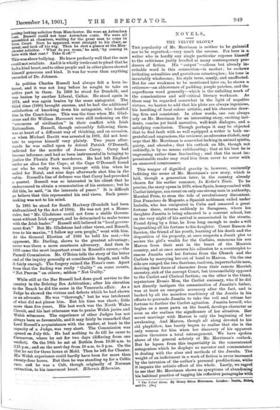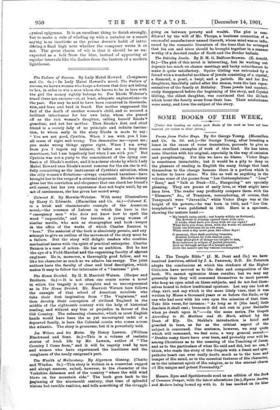NOVELS.
THE VELVET GLOVE"
THE popularity of Mr. Merriman is neither to be gainsaid nor to be regretted,—very much the reverse. For here is; a. writer who in hardly any single particular exposes himself to the criticisms justly levelled at many contemporary pro- ducers of fiction. His "output "—odious but already in. evita.ble word in this connection—is modest; he eschews irritating actualities and gratuitous catastrophes; his tone is invariably wholesome; his style terse, manly, and unaffected. But for one weakness to be mentioned later on, he shows a reticence—an abhorrence of padding, purple patches, and the superfluous word generally—which is the unfailing mark of the conscientious and self-critical literary workman. As these may be regarded somewhat in the light of negative virtues, we hasten to add that his plots are always ingenious, his handling of local colour artistic, and his character draw- ing firm and consistent. In other words, one can always rely on Mr. Merriman for an interesting story, exciting inci- dents, concise yet lucid narrative, well-knit dialogue, and a- satisfying conclusion. Though perhaps it may be objected that to find fault with so well equipped a writer is both un- grateful and ungracious, the reviewer, as advocates diaboli, may urge that Mr. Merriman is somewhat lacking in animal spirits, gaiety, and abandon; that his outlook on life, though not unkindly, is by no means exhilarating; that at his best he is engrossing rather than fascinating ; and that the most im- pressionable reader may read him from cover to cover with an unmoved countenance.
This temper of dignified gravity is, however, eminently befitting the scene of Mr. Merriman's new story, which is laid, though a generation later, in the country. already chosen for his earlier romance, In Kedar's Tents. To be precise, the story opens in 1870, when Spain, honeycombed with Carlist intrigue, can count on only one strong man in authority, Marshal Prim, to stem the tide of revolutionary discontent. Don Francisco de Mogente, a Spanish nobleman exiled under Isabella, who has emigrated to Cuba. and amassed a great fortune there, returns suddenly to Saragossa, where his daughter Juanita is being educated in a convent school, but on the very night of his arrival is assassinated in the streets. Found dying by a friar, he lives long enough to make a will bequeathing all his fortune to his daughter. Count Ramon de Sarrion, the friend of his youth, learning of his death and the disposition of his property, at once suspects a Jesuit plot to secure the girl's wealth for the Carlists, summons his son Marcos from their seat in the heart of the Moorish country, and at once secures his adhesion to a counterplot to- rescue Juanita and her fortune from the Church and the Carlists by marrying her out of hand to Marcos. -On the one side are ranged the two Sarrions, taciturn, imperturbable men, deriving their force of character from their remote Moorish ancestry, sick of the corrupt Court, but irreconcilably opposed to the Carlist and Clerical faction; on the other is the bland, mysterious Evasio Mon, the Carlist emissary, who if he did not directly instigate the assassination of Juanita's father, was at least an energetic accessory after the fact, and is backed by all the noiseless machinery of the Jesuits in his efforts to persuade Juanita to take the veil and release her fortune to further the Carlist agitation. Juanita herself, who begins as a mere pawn on the board, develops character as soon as she realises the significance of her situation. Her secret marriage with Marcos is only the beginning of her awakening. And Marcos, though all along devoted to his old playfellow, has barely begun to realise that she is the only woman for him when her discovery of his apparent motive threatens a total estrangement. We have spoken above of the general sobriety of Mr. Merriman 's outlook. But he lapses from this impartiality in the coneentrated antagonism which he displays as narrator and commentator in dealing with the aims and methods of the Jesuits. The weight of an indictment in a work of fiction is never increased by the intrusion of the author's personal predilections, while it impairs the artistic effect of the whole. Lastly, we regret to see that Mr. Merriman shows no symptoms of abandoning his habitual practice of tagging his reflective paragraphs with • The Velvet Glove. By- Henry Beton Mernman. London: 71116/44 and Co. Os.] cynical epigrams. It is an excellent thing to finish strongly, but to make a rule of winding up with a paradox or a smart saying is as inartistic as the prima donna's habit of intro- dieting a final high note whether the composer wrote it or not. The great charm of wit is that it should be as un- expected as a bolt from the blue, instead of appearing at regular intervals like the flashes from the lantern of a modern lighthouse.















































 Previous page
Previous page